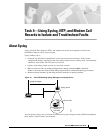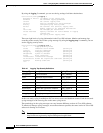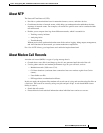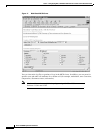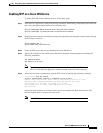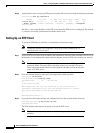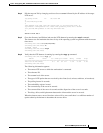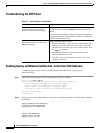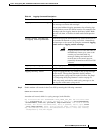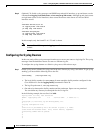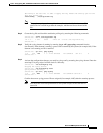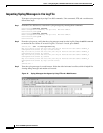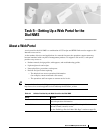
Task 4Using Syslog, NTP, and Modem Call Records to Isolate and Troubleshoot Faults
About Modem Call Records
%"
Basic Dial NMS Implementation Guide
Troubleshooting the NTP Client
Enabling Syslog and Modem Call Records in the Cisco IO S Software
To enable syslog messages in the Cisco IOS software and send them to a syslog server,
follow these steps:
Step 1
Inspect the current logging status by entering the following command:
travis-nas-01#show logging
Syslog logging: enabled (0 messages dropped, 0 flushes, 0 overruns)
Console logging: level debugging, 42 messages logged
Monitor logging: level debugging, 93 messages logged
Buffer logging: level debugging, 3 messages logged
Trap logging: level informational, 121 message lines logged
Log Buffer (8192 bytes):
travis-nas-01#
Step 2
Set up a basic syslog configuration by entering the following commands. See Table 20 for command
descriptions.
!
logging buffered 10000 debugging
no logging console guaranteed
logging console informational
!
!
logging trap debugging
logging facility local0
logging 172.21.100.100
!
Table 19 NTP Problems and Solutions
Problem Solution
The ntp.client file or the xntpd
daemon cannot be found in the
directories shown in the examples.
Verify that the workstation is running Solaris v2.6 or a later
version of Solaris. Enter the
uname -a
command to see the
version.
Versions earlier than Solaris v2.6 do not support NTP and must
be supplemented with additional NTP software available from
http://www.sunfreeware.com/
The error message “No Associations
IDs Returned” when you enter the
ntpq -p
command.
There are three possible solutions:
The network traffic is slow, and the workstation has not
had time to poll the NTP server. Allow the workstation
enough time to issue the poll (a few seconds); then, enter
the
ntpq -p
command.
The mulitcastclient line in the ntp.conf file was not
replaced with the server line.
The NTP server you have chosen is down, or it is not
configured correctly.




